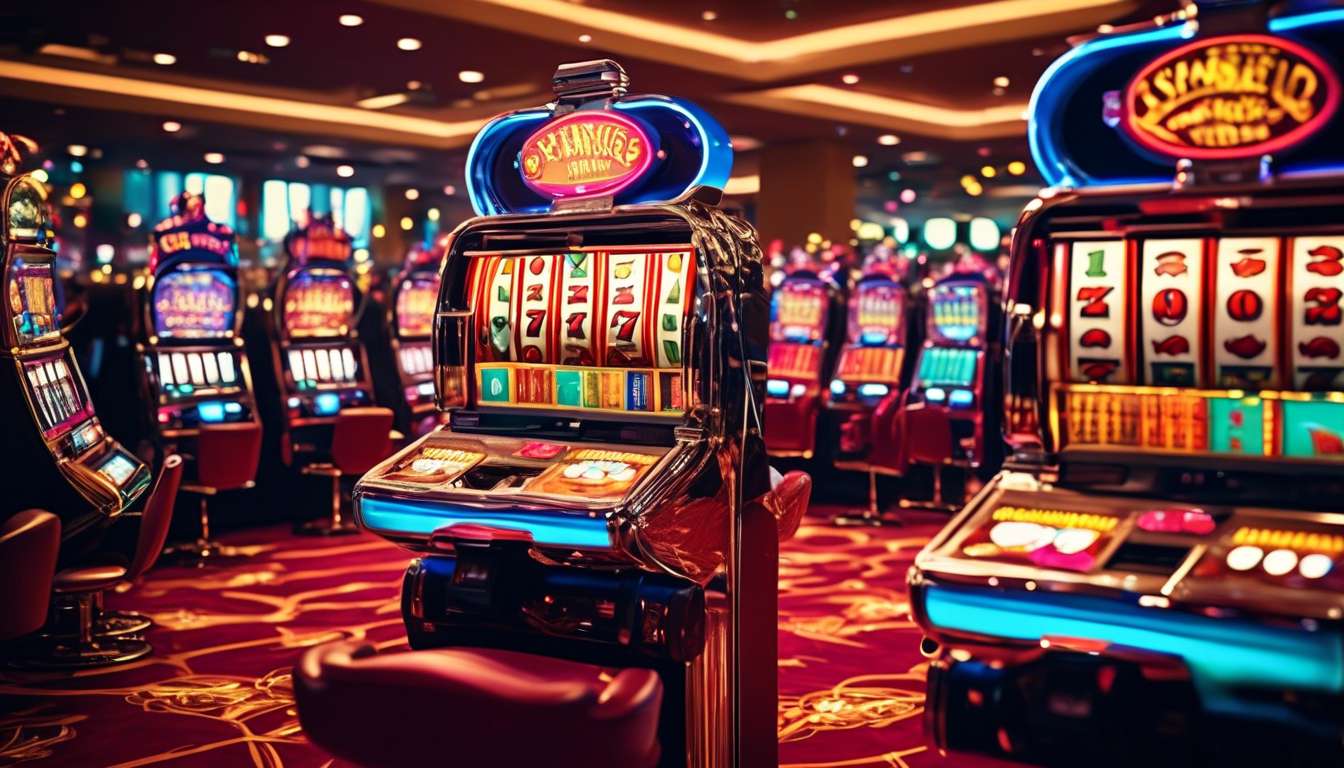As we gather around the glowing slot machines in casinos, we find ourselves entranced by the flashing lights and the rhythmic sounds that promise the thrill of a possible win. Beyond the allure and excitement, there’s an intriguing psychological aspect at play: the reinforcement schedule that governs how these machines reward us.
Gambling at a slot machine exemplifies a variable ratio reinforcement schedule:
- Rewards are given after an unpredictable number of plays.
- This unpredictability keeps us engaged, as each pull of the lever might just be the one that pays off.
By examining this reinforcement schedule, we gain insight into why these machines captivate us so effectively.
We will delve into the mechanics of this schedule, exploring:
- How it influences our behavior.
- Why it is so effective at keeping us coming back for more.
Join us as we uncover the fascinating intersection of psychology and gaming.
The Basics of Reinforcement Schedules
Reinforcement schedules determine how and when a behavior is rewarded, shaping the way we learn and maintain actions over time.
In our journey to understand these schedules, we often encounter the concept of variable ratio reinforcement. This schedule keeps us engaged by unpredictably rewarding our actions, much like how a slot machine operates. It taps into our natural desire for belonging and success, making us feel like we’re just a spin away from winning.
Our brain reacts to these unpredictable rewards by releasing dopamine, the feel-good neurotransmitter. This surge of dopamine doesn’t just make us happy; it motivates us to repeat the behavior, hoping for another reward. We’re all wired to seek that rush, making the variable ratio schedule particularly compelling.
Moreover, our cognitive biases come into play. We might:
- Overestimate our chances of winning
- Continue playing due to the illusion of control
Together, these elements form a powerful cycle, deeply influencing how we learn and maintain behaviors in our social groups.
Understanding Variable Ratio Schedules
In a variable ratio schedule, rewards are received after an unpredictable number of responses, keeping us engaged and eager for the next payout. This type of reinforcement taps into our deep-rooted desire to belong and succeed.
Each spin on the slot machine dangles the tantalizing possibility of winning, fueling our anticipation. The unpredictability of a variable ratio schedule triggers our brain’s dopamine release, making every win feel like an exhilarating triumph. Dopamine, the neurotransmitter connected to pleasure and reward, reinforces our behavior, making us more likely to continue playing.
As we engage with these variable ratio schedules, cognitive biases come into play. Our brains often overestimate the likelihood of a win due to the "gambler’s fallacy," where we assume a win is just around the corner.
Together, these elements create a compelling loop that keeps us hooked. We share this journey with others, building a sense of community around shared experiences and the hope of striking it big.
Variable Ratio vs. Fixed Ratio
In comparing variable ratio and fixed ratio schedules, we find that:
-
Variable ratio schedules offer unpredictable rewards, which keep us engaged due to the thrill of uncertainty. This unpredictability releases dopamine, making us feel excited and emotionally rewarded, as if we’re part of something bigger.
-
Fixed ratio schedules provide reinforcement after a set number of actions. This is similar to completing a task for a guaranteed reward. While there is a sense of achievement, it lacks the spontaneous allure of variable ratios.
Our cognitive biases often lead us to overestimate the likelihood of winning in variable scenarios, which fuels our motivations.
Together, we navigate these schedules in our daily lives, whether through games or work. By recognizing the differences between them, we can better understand how they affect our behaviors and emotions.
Let’s embrace this knowledge, feeling connected in our shared human experience of seeking rewards.
Effects on Gambling Behavior
Our gambling behavior is significantly shaped by the reinforcement schedules that slot machines employ.
By using a variable ratio schedule, these machines create an unpredictable pattern of wins that keeps us engaged. This schedule taps into our desire for excitement and community, making us feel like part of a shared experience.
Each spin is a chance for a win, and the randomness heightens our anticipation, drawing us closer to those around us who are also seeking the thrill.
The Impact of Variable Ratio Schedules:
- Triggers our brain’s release of dopamine, a chemical that reinforces our actions and fuels our urge to continue playing.
- Makes us overlook losses and focus on the potential for a big win.
Cognitive Biases in Gambling:
- Belief that our luck is about to change.
- Feeling that we’re due for a win.
These biases strengthen our commitment to the game, creating a cycle that’s hard to break.
Dopamine Release and Rewards
The Role of Dopamine in Gambling
Our brain releases a surge of dopamine each time we anticipate or receive a reward from playing slot machines. This chemical activity makes us feel good, creating a sense of belonging to the thrilling world of gambling.
Slot Machines and Reinforcement Schedules
Slot machines operate on a variable ratio reinforcement schedule, meaning rewards are unpredictable and keep us on our toes. This unpredictability enhances the dopamine release, reinforcing our behavior as we chase that elusive jackpot.
Cognitive Biases and Gambling Behavior
We’ve all experienced those moments where we think, "Just one more spin," driven by cognitive biases that make us believe a win is just around the corner. These biases, combined with the dopamine rush, create a powerful loop of anticipation and reward.
Community and Connection
We feel connected to others who share this thrilling experience, as if we’re all part of a community striving for the same goal.
Understanding the Magnetic Pull
- Understanding the role of dopamine
- Recognizing cognitive biases
These insights help us see why slot machines have such a magnetic pull. Together, we’re drawn into this cycle, seeking that next exhilarating win.
Long-Term Impact on Players
Over time, the allure of slot machines can lead to significant financial and emotional consequences for players. The variable ratio schedule keeps us hooked, with its unpredictable rewards triggering dopamine surges. These moments of euphoria can make us feel like we’re part of an exclusive club, sharing in the thrill of potential wins. However, this excitement often masks the toll it takes on our wellbeing.
Consequences of Slot Machine Play:
- Constant exposure to dopamine highs can cloud judgment, making it difficult to recognize harmful behavior.
- Players often believe they are just one more spin away from a big win, a belief reinforced by the intermittent nature of the rewards.
- This mindset can lead to chasing losses, a common pitfall among players.
Support and Awareness:
- Our shared experiences can create a sense of camaraderie.
- It’s crucial to support each other in recognizing these patterns.
- Seeking help when needed is vital.
Together, we can navigate these challenges and prioritize our wellbeing.
Role of Cognitive Biases
Many of us fall prey to cognitive biases that skew our perception of winning odds when playing slot machines. The allure of the variable ratio schedule seems to promise us the next big win just around the corner.
As a community, we often share these experiences, reinforcing our belief that luck is on our side. This shared mindset can feel comforting, but it’s crucial to recognize how our brains might deceive us.
Our brains release dopamine when we anticipate rewards, making the experience thrilling and addictive. This chemical reaction can cloud our judgment, leading us to overlook how infrequently wins actually occur. We may convince ourselves we’re on a "winning streak" due to cognitive biases like the gambler’s fallacy, where we believe past outcomes affect future ones.
By understanding these biases, we can support each other in maintaining perspective. Together, we can remind ourselves that the odds remain the same, regardless of any perceived patterns or streaks.
Strategies for Responsible Gaming
We can adopt several practical strategies to ensure our gaming habits remain enjoyable and responsible.
1. Set Clear Limits
- Establish boundaries on both time and money spent on gambling.
- This strategy helps avoid the pitfalls of the variable ratio schedule that slot machines employ, which can lead to chasing elusive jackpots.
- Understanding that this reinforcement schedule triggers unpredictable rewards allows us to guard against the rush of dopamine that tempts us to continue playing.
2. Recognize and Challenge Cognitive Biases
- Be aware of cognitive biases that might make us believe we’re "due" for a win or that luck is on our side.
- Acknowledging these thoughts helps maintain perspective and stick to our predetermined limits.
3. Engage in Open Conversations
- Discuss gaming habits with friends and family.
- Sharing experiences fosters a sense of belonging and accountability, ensuring we do not isolate ourselves or fall into potentially harmful patterns.
By implementing these strategies, we can enjoy gaming responsibly and support one another in maintaining healthy gaming habits.
Conclusion
In conclusion, gambling at a slot machine exemplifies a variable ratio reinforcement schedule. This unpredictable pattern of rewards keeps players engaged and coming back for more.
The rush of dopamine release reinforces the behavior, leading to potential long-term impacts on players.
Understanding these reinforcement schedules and cognitive biases is crucial for promoting responsible gaming practices.

